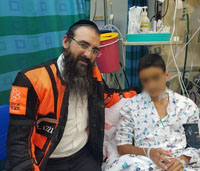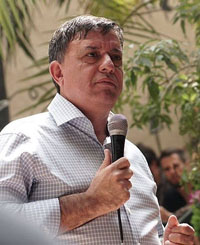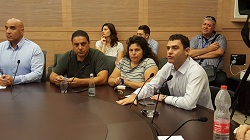SAN DIEGO — Following are some of the stories of Jewish interest that hit our editor’s computer mail box at editor@sdjewishworld.com on Tuesday, June 12. We are interested in local, national, and international news of Jewish interest, and welcome comments from members of the Jewish community about these news items.
Americans, Knesset Members Discuss Religious Pluralism

At a meeting between the American Jewish Committee’s Jewish Religious Equality Coalition (J-REC) and members of Israel’s Knesset, J-REC representatives expressed concern over the growing rift between Diaspora Jews and Israel, especially about younger Jews distancing from Israel.
The meeting took place during the AJC Global Forum, which has convened for the first time in Jerusalem.
MK Avraham Neguise (Likud), chairman of the Knesset’s Committee for Immigration, Absorption and Diaspora Affairs, opened the meeting by acknowledging the importance of Diaspora Jewry to Israel. “The Diaspora is a strategic asset for Israel. Every Jew in the Diaspora should see Israel as his homeland and should feel free to come here. We are all one family.”
Neguise, who is himself an Ethiopian immigrant, also mentioned that Diaspora Jewry has had a special role in absorbing new immigrants.
“As a former immigrant I know the role of Diaspora Jewry in the ingathering of exiles to Israel. You played, are playing and will play a critical role in this for Ethiopians, the Russian Jewish community and all over the world,” he said.
AJC President John Shapiro raised the key issue that bothers many J-REC representatives. “I worry about the next generation. When the Chief Rabbi says we’re worse than Holocaust deniers we (the older generation) get annoyed, but others back off,” he said.
Shapiro went on to recount his own personal experience. His son was active in countering anti-Israel propaganda on campus but after a decision to freeze development of the Western Wall’s pluralistic prayer area he called his father, and said, “Why are we even doing this, they’re pushing us away.”
Shapiro warned the MKs, “You are losing the next generation.”
Dov Zakheim, chair of J-REC, said Israel faces battles on three fronts – the Palestinian front, the Iranian front and the Diaspora front, which he called the Western front.
“All is not quiet on the Western Front,” said Zakheim. “It’s not just that the Rabbinate has reneged on the Kotel deal. It proposes now to centralize, to control entirely marriages, divorces, conversions, Jewish life in the Diaspora.”
Zakheim was referring to two points of contention between Israel’s religious establishment and Diaspora Jewry. The first is a plan, approved by the Israeli government in January 2016, and opposed by some religious parties along with the Chief Rabbinate, to upgrade the southern extension of the Wall to allow for egalitarian services, a single point of access and entry, and a joint authority including representatives from each of the religious movements to supervise what takes place at the southern extension. The second refers to attempts by Israel’s religious establishment to extend their authority abroad.
Zakheim noted the dangers these controversies pose. “First of all, it divides us. We are one people. Second, it divides us into classes, we have first class Jews that the Chief Rabbinate recognizes and then there is everyone else who are second class (Jews).”
Marvin Israelow, chair of AJC’s Israel Office, spoke in a similar vein about how Reform rabbinical students spend their first year of studies at their Israel campus. But, after the way they are treated, “they have to undergo a reeducation process when they go back to the United States to change the negative attitude they come back with,” said Israelow. “These rabbis are our chief educators in the United States.”
J-REC representative Shonni Silverberg observed, “Many young Jews are not assimilating, but what’s happening, and I despair about this, is that their definition of Jewishness does not include Israel.”
MK Rachel Azaria (Kulanu) assured the J-REC representatives they were not alone. “Most Israeli Jews don’t want the Rabbinate, 80% (want to end the Rabbinate’s monopoly).”
But she acknowledged that Israeli and American Jews may not be working with the same timetable for change. “We want change, but with the politics we can’t (do it right away). It will take 10 to 15 years, but our tipping point is different from your tipping point.”
Neguise ended the meeting by noting that he “comes from a community that had to struggle for recognition. Last year I boycotted the government when they wouldn’t bring over Ethiopians whose father was Jewish (but the mother was not) and now they are here.” — From American Jewish Committee
*
Boy, believed dead, saved by United Hatzalah

About 4:30 a.m., an emergency call was received last week by United Hatzalah’s national dispatch and command center hotline at 1221. The call came in alerting the dispatch that a 15-year-old boy had lost consciousness in his home in the city of Holon.
The dispatch center alerted the closest responders to the incident and immediately Hillel Hamoi and Na’or Barel who both live one street away from where the incident took place, jumped out of bed and raced to the location of the incident. The pair of volunteer EMTs arrived in less than two minutes and were the first responders at the scene. The arrived at the boy’s side and saw that he was not breathing and had no pulse. They immediately begin CPR protocol that included several shocks from a defibrillator, compressions, and ventilation. The boy was taken to Wolfson Medical Center in Holon where he was helped to breathe with a respirator.
The boy’s condition was listed as critical and doctors were not optimistic about his chance of survival. However, that same night that he was brought in, the boy regained consciousness to the shock and surprise of his entire medical team. He began to speak to his doctors and even joke with them.
The two volunteers went to visit the young boy in the intensive care ward of the hospital on Sunday to wish him well during his recuperation. The father of the young boy spoke to the volunteers who helped save his son’s life during the emotional meeting. “I remember that everything was very erratic. Everyone was stressed out and not sure what to do. You both arrived so fast that we were still on the phone with the dispatch center when you came in the door. Doctors here at the hospital have told me that there is no doubt that my son would be dead today if it wasn’t for your quick arrival and treatment.” — From United Hatzalah
*
Labor Party chair would reinstate pluralistic prayer at Kotel, end support for remote settlements

MK Avi Gabbay, chairman of Israel’s Labor Party, told the AJC Global Forum Monday night that if elected Prime Minister, he would reinstate a compromise reached earlier regarding pluralistic prayer at the Western Wall. He also affirmed the critical importance of the U.S.-Israel relationship, proposed increased humanitarian aid for Gaza, demanded that Palestinians end incitement against Israel, and criticized support for remote Israeli settlements.
In June 2017, the Israeli government froze an agreement to create a pluralistic prayer area near the Western Wall. In his speech, Gabbay implicitly attacked this decision. “All of you are brothers and sisters, ultra-Orthodox or Orthodox, Conservative or Reform – affiliated or unaffiliated – you are all our brothers and sisters! The Kotel (Western Wall) belongs to all of us equally, and I will implement the Kotel compromise as it was signed!”
On U.S.-Israel ties, Gabbay said, “a core foundation of our security is the alliance with the United States of America. This is, of course, defined by our shared values, by the incredible bipartisan voice for Israel in Congress. We must keep support for Israel in Congress and throughout America bipartisan.”
Gabbay took a hard line against recent violence in Gaza, which he blamed on Hamas. “What we have seen over the past few weeks is a well-organized Hamas military operation that mixes civilians among Hamas terrorists. Our soldiers are acting with courage and restraint to ensure that Hamas cannot send Gazans to cross our border and kill our innocent civilians,” he said.
He also expressed support for the current military policies against Hamas, but declared that new thinking is needed to break the current impasse. “While I support an aggressive military response to every attack made on us, we must focus on long-term policy to prevent the next round of fighting,” said Gabbay. “We must also acknowledge the fact that, for 11 years, we failed to change the fundamentals in Gaza, and it’s time for a new strategy. We believe in humanitarian relief directed to the Gazans and not for Hamas – exactly as our military recommends.”
He did, however, link new policies toward Gaza to the desired return of Israeli hostages being held by Hamas, including the remains of Israeli soldiers killed in action. The family of one of these soldiers, Lieutenant Hadar Goldin, addressed the session afterwards.
Gabbay also demanded that the Palestinian Authority take a much harder stance against anti-Israel incitement. “The Palestinian incitement must end immediately, because it has anti-Semitic parts, because it leads to terror attacks, and because it moves the Israeli public away from peace. And part of ending the incitement is ending the incentives. The Palestinian Authority must stop paying their terrorists,” he said.
But he also called on the Israeli government to stop supporting remote settlements in the West Bank. “On our side, we must stop building these caravans on hilltops and glorifying these remote settlements – because they do not provide any security value to Israel,” he said. — From American Jewish Committee
*
Knesset Committee investigates alleged harassment of female prison guards

The Knesset Internal Affairs Committee convened Tuesday to discuss a report in which female prison guards allege to have been sexually harassed by terrorists after being transferred to the high-level security ward at the request of an influential terrorist whose name authorities have declined to divulge.
According to the report published by Channel 20, the prison intelligence officer instructed two female prison guards at Gilboa Prison, located in the Beit She’an Valley Regional Council, to be transferred to the high-level security ward following the request of a “leading” inmate.
The guards alleged that the intelligence officer ordered them to go to the high-security ward in order to “maintain order” in the prison by placating the terrorists.
The committee was attended by Chief Commissioner of the Israel Prison Service, Ofra Klinger, various members of Knesset and bereaved families.
Commissioner Klinger stated that the claims of the report are currently under investigation.
Herzl and Merav Hajaj, parents of Shir Hajaj who was murdered last year in a truck ramming attack in Jerusalem, stated that the report sheds light on another aspect of the lavish benefits and treatment that terrorists enjoy in prisons.
Im Tirtzu CEO Matan Peleg also spoke at the committee. “These are disturbing reports that need to be investigated to the fullest extent,” said Peleg. “Ignoring these reports in order to ‘maintain order’ in the prison is a dangerous precedent that will lead to further harm.” — From Im Tirzu
Preceding culled from news releases.